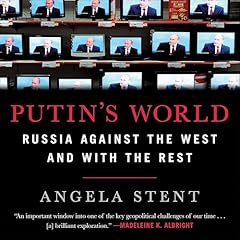
Near Abroad
Putin, the West, and the Contest over Ukraine and the Caucasus
No se pudo agregar al carrito
Add to Cart failed.
Error al Agregar a Lista de Deseos.
Error al eliminar de la lista de deseos.
Error al añadir a tu biblioteca
Error al seguir el podcast
Error al dejar de seguir el podcast
 Exclusivo para miembros Prime: ¿Nuevo en Audible? Obtén 2 audiolibros gratis con tu prueba.
Exclusivo para miembros Prime: ¿Nuevo en Audible? Obtén 2 audiolibros gratis con tu prueba.Compra ahora por $22.22
-
Narrado por:
-
Christopher Douyard
-
De:
-
Gerard Toal
Before Russia invaded Ukraine, it invaded Georgia. Both states are part of Russia's "near abroad"—newly independent states that were once part of the Soviet Union. While the Russia-Georgia war of 2008 faded from the headlines in the wake of the global recession, the geopolitical contest that created it did not. Six years later, the specter of a revanchist Russia returned when Putin's forces invaded and annexed the Crimean peninsula. Crimea's annexation and follow on conflict in eastern Ukraine have generated the greatest geopolitical crisis on the European continent since the end of the Cold War.
In Near Abroad, the eminent political geographer Gerard Toal moves beyond the polemical rhetoric that surrounds Russia's interventions in Georgia and Ukraine to study the underlying territorial conflicts and geopolitical struggles. Central to understanding are legacies of the Soviet Union collapse: unresolved territorial issues, weak states and a conflicted geopolitical culture in Russia over the new territorial order. The West's desire to expand NATO contributed to a growing geopolitical contest in Russia's near abroad. This found expression in a 2008 NATO proclamation that Georgia and Ukraine will become members of NATO, a "red line" issue for Russia. The road to invasion and war in Georgia and Ukraine, thereafter, is explained in Near Abroad.
©2017 Oxford University Press (P)2022 TantorLos oyentes también disfrutaron:




















Unlike, say, Tim Marshall's take that geography is deterministic (at least somewhat) in terms of why states act the way the way they do, Gerard Toal dives into the scholastic literature on affect and the role of fear in Vladimir Putin's actions. Toal explores a range of motivations regarding Russia's actions in Georgia and its breakaway regions of Abkhazia and South Ossetia, and in Ukraine - including Crimea and the Donbas - and critiques each of them.
Like Tim Marshall, everything flows from the collapse of the Soviet Union and the subsequent breakup of Russian Empire masquerading as the USSR. 'Affect' - the role of emotions, in both autocratic societies like Russia and democratic societies like the USA and EU - is fully elucidated in regards to the collapse and breakup of the USSR.
The first chapter is a bit rough; it is clearly aimed at academics. But hang in there. The rest is aimed at both students of geopolitics and interested news and current events junkies.
Want to understand the current Russo-Ukraine War?
Se ha producido un error. Vuelve a intentarlo dentro de unos minutos.


